Ukraine’s military has destroyed a Russian A-50 surveillance aircraft, Air Force Commander Mykola Oleshchuk said on Friday.
“The A-50 with the call sign ‘Bayan’ has flown its last!” Oleshchuk wrote on the Telegram messaging app.
Neoconservativism isn't limited to former Democrats.
Look in the mirror for an example of a Republican who embraces internationalism
/div>
Neoconservatism is a political movement that began in the United States and the United Kingdom during the 1960s during the Vietnam War among foreign policy hawks who became disenchanted with the increasingly pacifist Democratic Party and with the growing New Left and counterculture of the 1960s. Neoconservatives typically advocate the unilateral promotion of democracy and interventionism in international affairs, grounded in a militaristic and realist philosophy of "peace through strength." They are known for espousing opposition to communism and political radicalism.[1][2]
Many adherents of neoconservatism became politically influential during the Republican presidential administrations of the 1960s, 1970s, 1980s, 1990s and 2000s, peaking in influence during the administration of George W. Bush, when they played a major role in promoting and planning the 2003 invasion of Iraq. Prominent neoconservatives in the George W. Bush administration included Paul Wolfowitz, Elliott Abrams, Richard Perle, Paul Bremer, and Douglas Feith.
Although U.S. Vice President Dick Cheney and Secretary of Defense Donald Rumsfeld had not self-identified as neoconservatives, they worked closely alongside neoconservative officials in designing key aspects of George W. Bush's foreign policy; especially in their support of Israel, promotion of American influence in the Arab World and launching the "War on Terror".[3] Bush administration's domestic and foreign policies were heavily influenced by major ideologues affiliated with neo-conservatism, such as Bernard Lewis, Lulu Schwartz, Daniel Pipes, David Horowitz, Robert Kagan, etc.[4]
Critics of neoconservatism have used the term to describe foreign policy and war hawks who support aggressive militarism or neo-imperialism. Historically speaking, the term neoconservative refers to those who made the ideological journey from the anti-Stalinist left to the camp of American conservatism during the 1960s and 1970s.[5] The movement had its intellectual roots in the magazine Commentary, edited by Norman Podhoretz.[6] They spoke out against the New Left, and in that way helped define the movement.[7][8]
Terminology[edit]
The term neoconservative was popularized in the United States during 1973 by the socialist leader Michael Harrington, who used the term to define Daniel Bell, Daniel Patrick Moynihan, and Irving Kristol, whose ideologies differed from Harrington's.[9] Earlier during 1973, he had described some of the same ideas in a brief contribution to a symposium on welfare sponsored by Commentary.[10]
The neoconservative label was used by Irving Kristol in his 1979 article "Confessions of a True, Self-Confessed 'Neoconservative'".[11] His ideas have been influential since the 1950s, when he co-founded and edited the magazine Encounter.[12]
Another source was Norman Podhoretz, editor of the magazine Commentary, from 1960 to 1995. By 1982, Podhoretz was terming himself a neoconservative in The New York Times Magazine article titled "The Neoconservative Anguish over Reagan's Foreign Policy".[13][14]
The term itself was the product of a rejection among formerly self-identified liberals of what they considered a growing leftward turn of the Democratic Party in the 1970s. Neoconservatives saw in that new left liberalism an ideological effort to distance the Democratic Party and American liberalism from Cold War liberalism as it was espoused by former Presidents such as Harry S. Truman, John F. Kennedy and Lyndon B. Johnson. After the Vietnam War, the anti-communist, internationalist and interventionist roots of this Cold War liberalism seemed increasingly brittle to the neoconservatives. As a consequence they migrated to the Republican Party and formed one pillar of the Reagan Coalition and of the conservative movement. Hence, they became Neo-conservatives.[15]
History[edit]

Senator
Henry M. Jackson, an inspiration for neoconservative foreign policy during the 1970s
Through the 1950s and early 1960s, the future neoconservatives had endorsed the civil rights movement, racial integration and Martin Luther King Jr.[16] From the 1950s to the 1960s, liberals generally endorsed military action in order to prevent a communist victory in Vietnam.[17]
Neoconservatism was initiated by the repudiation of the Cold War and the "New Politics" of the American New Left, which Norman Podhoretz said was too sympathetic to the counterculture and too alienated from the majority of the population; and "anti-anticommunism", which included substantial endorsement of Marxist–Leninist politics during the late 1960s. Many neoconservatives were particularly alarmed by what they believed were the antisemitic sentiments of Black Power advocates.[18] Irving Kristol edited the journal The Public Interest (1965–2005), featuring economists and political scientists, which emphasized ways that government planning in the liberal state had produced unintended harmful consequences.[19] Many early neoconservative political figures were disillusioned Democratic politicians and intellectuals, such as Daniel Patrick Moynihan, who served in the Nixon and Ford administrations, and Jeane Kirkpatrick, who served as United States Ambassador to the United Nations in the Reagan administration. Many left-wing academics such as Frank Meyer and James Burnham eventually became associated with the conservative movement at this time.[20]
A substantial number of neoconservatives were originally moderate socialists who were originally associated with the moderate wing of the Socialist Party of America (SP) and its successor party, Social Democrats, USA (SDUSA). Max Shachtman, a former Trotskyist theorist who developed a strong feeling of antipathy towards the New Left, had numerous devotees among SDUSA with strong links to George Meany's AFL-CIO. Following Shachtman and Meany, this faction led the SP to oppose immediate withdrawal from the Vietnam War, and oppose George McGovern in the Democratic primary race and, to some extent, the general election. They also chose to cease their own party-building and concentrated on working within the Democratic Party, eventually influencing it through the Democratic Leadership Council.[21] Thus the Socialist Party dissolved in 1972, and SDUSA emerged that year. (Most of the left-wing of the party, led by Michael Harrington, immediately abandoned SDUSA.)[22][23] SDUSA leaders associated with neoconservatism include Carl Gershman, Penn Kemble, Joshua Muravchik and Bayard Rustin.[24][25][26][27]
Norman Podhoretz's magazine Commentary, originally a journal of liberalism, became a major publication for neoconservatives during the 1970s. Commentary published an article by Jeane Kirkpatrick, an early and prototypical neoconservative.
Rejecting the American New Left and McGovern's New Politics[edit]
As the policies of the New Left made the Democrats increasingly leftist, these intellectuals became disillusioned with President Lyndon B. Johnson's Great Society domestic programs. The influential 1970 bestseller The Real Majority by Ben Wattenberg expressed that the "real majority" of the electorate endorsed economic interventionism, but also social conservatism; and warned Democrats it could be disastrous to adopt liberal positions on certain social and crime issues.[28]
The neoconservatives rejected the countercultural New Left and what they considered anti-Americanism in the non-interventionism of the activism against the Vietnam War. After the anti-war faction took control of the party during 1972 and nominated George McGovern, the Democrats among them endorsed Washington Senator Henry "Scoop" Jackson instead for his unsuccessful 1972 and 1976 campaigns for president. Among those who worked for Jackson were incipient neoconservatives Paul Wolfowitz, Doug Feith, and Richard Perle.[29] During the late 1970s, neoconservatives tended to endorse Ronald Reagan, the Republican who promised to confront Soviet expansionism. Neoconservatives organized in the American Enterprise Institute and The Heritage Foundation to counter the liberal establishment.[30] Author Keith Preston named the successful effort on behalf of neoconservatives such as George Will and Irving Kristol to cancel Reagan's 1980 nomination of Mel Bradford, a Southern Paleoconservative academic whose regionalist focus and writings about Abraham Lincoln and Reconstruction alienated the more cosmopolitan and progress-oriented neoconservatives, to the leadership of the National Endowment for the Humanities in favor of longtime Democrat William Bennett as emblematic of the neoconservative movement establishing hegemony over mainstream American conservatism.[20]
In another (2004) article, Michael Lind also wrote:[31].mw-parser-output .templatequote{overflow:hidden;margin:1em 0;padding:0 32px}.mw-parser-output .templatequote .templatequotecite{line-height:1.5em;text-align:left;padding-left:1.6em;margin-top:0}
Neoconservatism ... originated in the 1970s as a movement of anti-Soviet liberals and social democrats in the tradition of Truman, Kennedy, Johnson, Humphrey and Henry ('Scoop') Jackson, many of whom preferred to call themselves 'paleoliberals.' [After the end of the Cold War] ... many 'paleoliberals' drifted back to the Democratic center ... Today's neocons are a shrunken remnant of the original broad neocon coalition. Nevertheless, the origins of their ideology on the left are still apparent. The fact that most of the younger neocons were never on the left is irrelevant; they are the intellectual (and, in the case of William Kristol and John Podhoretz, the literal) heirs of older ex-leftists.
Leo Strauss and his students[edit]
C. Bradley Thompson, a professor at Clemson University, claims that most influential neoconservatives refer explicitly to the theoretical ideas in the philosophy of Leo Strauss (1899–1973),[32] although there are several writers who claim that in doing so they may draw upon meaning that Strauss himself did not endorse. Eugene Sheppard notes: "Much scholarship tends to understand Strauss as an inspirational founder of American neoconservatism".[33] Strauss was a refugee from Nazi Germany who taught at the New School for Social Research in New York (1938–1948) and the University of Chicago (1949–1969).[34]
Strauss asserted that "the crisis of the West consists in the West's having become uncertain of its purpose". His solution was a restoration of the vital ideas and faith that in the past had sustained the moral purpose of the West. The Greek classics (classical republican and modern republican), political philosophy and the Judeo-Christian heritage are the essentials of the Great Tradition in Strauss's work.[35][36] Strauss emphasized the spirit of the Greek classics and Thomas G. West (1991) argues that for Strauss the American Founding Fathers were correct in their understanding of the classics in their principles of justice.[37]
For Strauss, political community is defined by convictions about justice and happiness rather than by sovereignty and force. A classical liberal, he repudiated the philosophy of John Locke as a bridge to 20th-century historicism and nihilism and instead defended liberal democracy as closer to the spirit of the classics than other modern regimes.[38] For Strauss, the American awareness of ineradicable evil in human nature and hence the need for morality, was a beneficial outgrowth of the pre-modern Western tradition.[39] O'Neill (2009) notes that Strauss wrote little about American topics, but his students wrote a great deal and that Strauss's influence caused his students to reject historicism and positivism as morally relativist positions.[40] They instead promoted a so-called Aristotelian perspective on America that produced a qualified defense of its liberal constitutionalism.[41] Strauss's emphasis on moral clarity led the Straussians to develop an approach to international relations that Catherine and Michael Zuckert (2008) call Straussian Wilsonianism (or Straussian idealism), the defense of liberal democracy in the face of its vulnerability.[40][42]
Strauss influenced The Weekly Standard editor Bill Kristol, William Bennett, Newt Gingrich, Antonin Scalia and Clarence Thomas, as well as Paul Wolfowitz.[43][44]
Jeane Kirkpatrick[edit]
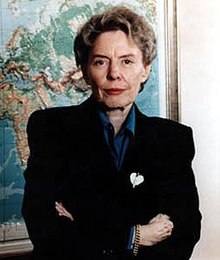 Jeane Kirkpatrick
Jeane KirkpatrickA theory of neoconservative foreign policy during the final years of the Cold War was articulated by Jeane Kirkpatrick in "Dictatorships and Double Standards",[45] published in Commentary Magazine during November 1979. Kirkpatrick criticized the foreign policy of Jimmy Carter, which endorsed détente with the Soviet Union. She later served the Reagan Administration as Ambassador to the United Nations.[46]
Skepticism towards democracy promotion[edit]
In "Dictatorships and Double Standards", Kirkpatrick distinguished between authoritarian regimes and the totalitarian regimes such as the Soviet Union. She suggested that in some countries democracy was not tenable and the United States had a choice between endorsing authoritarian governments, which might evolve into democracies, or Marxist–Leninist regimes, which she argued had never been ended once they achieved totalitarian control. In such tragic circumstances, she argued that allying with authoritarian governments might be prudent. Kirkpatrick argued that by demanding rapid liberalization in traditionally autocratic countries, the Carter administration had delivered those countries to Marxist–Leninists that were even more repressive. She further accused the Carter administration of a "double standard" and of never having applied its rhetoric on the necessity of liberalization to communist governments. The essay compares traditional autocracies and Communist regimes:
[Traditional autocrats] do not disturb the habitual rhythms of work and leisure, habitual places of residence, habitual patterns of family and personal relations. Because the miseries of traditional life are familiar, they are bearable to ordinary people who, growing up in the society, learn to cope.
[Revolutionary Communist regimes] claim jurisdiction over the whole life of the society and make demands for change that so violate internalized values and habits that inhabitants flee by the tens of thousands.
Kirkpatrick concluded that while the United States should encourage liberalization and democracy in autocratic countries, it should not do so when the government risks violent overthrow and should expect gradual change rather than immediate transformation.[47] She wrote: "No idea holds greater sway in the mind of educated Americans than the belief that it is possible to democratize governments, anytime and anywhere, under any circumstances ... Decades, if not centuries, are normally required for people to acquire the necessary disciplines and habits. In Britain, the road [to democratic government] took seven centuries to traverse. ... The speed with which armies collapse, bureaucracies abdicate, and social structures dissolve once the autocrat is removed frequently surprises American policymakers".[48]
During the 1990s, neoconservatives were once again opposed to the foreign policy establishment, both during the Republican Administration of President George H. W. Bush and that of his Democratic successor, President Bill Clinton. Many critics charged that the neoconservatives lost their influence as a result of the end of the Soviet Union.[49]
After the decision of George H. W. Bush to leave Saddam Hussein in power after the first Iraq War during 1991, many neoconservatives considered this policy and the decision not to endorse indigenous dissident groups such as the Kurds and Shiites in their 1991–1992 resistance to Hussein as a betrayal of democratic principles.[50][51][52][53][54]
Some of those same targets of criticism would later become fierce advocates of neoconservative policies. During 1992, referring to the first Iraq War, then United States Secretary of Defense and future Vice President Richard Cheney said:
I would guess if we had gone in there, I would still have forces in Baghdad today. We'd be running the country. We would not have been able to get everybody out and bring everybody home. And the question in my mind is how many additional American casualties is Saddam [Hussein] worth? And the answer is not that damned many. So, I think we got it right, both when we decided to expel him from Kuwait, but also when the president made the decision that we'd achieved our objectives and we were not going to go get bogged down in the problems of trying to take over and govern Iraq.[55]
Within a few years of the Gulf War in Iraq, many neoconservatives were endorsing the ousting of Saddam Hussein. On 19 February 1998, an open letter to President Clinton was published, signed by dozens of pundits, many identified with neoconservatism and later related groups such as the Project for the New American Century, urging decisive action to remove Saddam from power.[56]
Neoconservatives were also members of the so-called "blue team", which argued for a confrontational policy toward the People's Republic of China and strong military and diplomatic endorsement for the Republic of China (also known as Formosa or Taiwan).
Administration of George W. Bush[edit]
The Bush campaign and the early Bush administration did not exhibit strong endorsement of neoconservative principles. As a presidential candidate, Bush had argued for a restrained foreign policy, stating his opposition to the idea of nation-building.[57] Also early in the administration, some neoconservatives criticized Bush's administration as insufficiently supportive of Israel and suggested Bush's foreign policies were not substantially different from those of President Clinton.[58]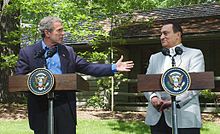 During November 2010, former U.S. President George W. Bush (here with the former President of Egypt Hosni Mubarak at Camp David in 2002) wrote in his memoir Decision Points that Mubarak endorsed the administration's position that Iraq had WMDs before the war with the country, but kept it private for fear of "inciting the Arab street"[59]
During November 2010, former U.S. President George W. Bush (here with the former President of Egypt Hosni Mubarak at Camp David in 2002) wrote in his memoir Decision Points that Mubarak endorsed the administration's position that Iraq had WMDs before the war with the country, but kept it private for fear of "inciting the Arab street"[59]
Bush's policies changed dramatically immediately after the 11 September 2001 attacks.
During Bush's State of the Union speech of January 2002, he named Iraq, Iran and North Korea as states that "constitute an axis of evil" and "pose a grave and growing danger". Bush suggested the possibility of preemptive war: "I will not wait on events, while dangers gather. I will not stand by, as peril draws closer and closer. The United States of America will not permit the world's most dangerous regimes to threaten us with the world's most destructive weapons".[60][61]
Some major defense and national-security persons have been quite critical of what they believed was a neoconservative influence in getting the United States to go to war against Iraq.[62]
Former Nebraska Republican U.S. senator and Secretary of Defense, Chuck Hagel, who has been critical of the Bush administration's adoption of neoconservative ideology, in his book America: Our Next Chapter wrote:
So why did we invade Iraq? I believe it was the triumph of the so-called neo-conservative ideology, as well as Bush administration arrogance and incompetence that took America into this war of choice. ... They obviously made a convincing case to a president with very limited national security and foreign policy experience, who keenly felt the burden of leading the nation in the wake of the deadliest terrorist attack ever on American soil.
Bush Doctrine[edit]
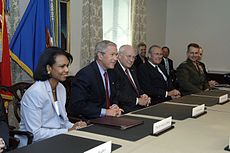
President Bush, VP Dick Cheney, and Secretary of State Condoleezza Rice meet with Secretary of Defense Donald Rumsfeld and his staff at the Pentagon, 14 August 2006
The Bush Doctrine of preemptive war was stated explicitly in the National Security Council (NSC) text "National Security Strategy of the United States". published 20 September 2002: "We must deter and defend against the threat before it is unleashed ... even if uncertainty remains as to the time and place of the enemy's attack. ... The United States will, if necessary, act preemptively".[63]
The choice not to use the word "preventive" in the 2002 National Security Strategy and instead use the word "preemptive" was largely in anticipation of the widely perceived illegality of preventive attacks in international law via both Charter Law and Customary Law.[64] In this context, disputes over the non-aggression principle in domestic and foreign policy, especially given the doctrine of preemption, alternatively impede and facilitate studies of the impact of libertarian precepts on neo-conservatism.
Policy analysts noted that the Bush Doctrine as stated in the 2002 NSC document had a strong resemblance to recommendations presented originally in a controversial Defense Planning Guidance draft written during 1992 by Paul Wolfowitz, during the first Bush administration.[65]
The Bush Doctrine was greeted with accolades by many neoconservatives. When asked whether he agreed with the Bush Doctrine, Max Boot said he did and that "I think [Bush is] exactly right to say we can't sit back and wait for the next terrorist strike on Manhattan. We have to go out and stop the terrorists overseas. We have to play the role of the global policeman. ... But I also argue that we ought to go further".[66] Discussing the significance of the Bush Doctrine, neoconservative writer Bill Kristol claimed: "The world is a mess. And, I think, it's very much to Bush's credit that he's gotten serious about dealing with it. ... The danger is not that we're going to do too much. The danger is that we're going to do too little".[67]
2008 presidential election and aftermath[edit]

President
George W. Bush and Senator
John McCain at the White House, 5 March 2008, after McCain became the Republican presumptive presidential nominee
John McCain, who was the Republican candidate for the 2008 United States presidential election, endorsed continuing the second Iraq War, "the issue that is most clearly identified with the neoconservatives". The New York Times reported further that his foreign policy views combined elements of neoconservatism and the main competing conservative opinion, pragmatism, also known as realism:[68]
Among [McCain's advisers] are several prominent neoconservatives, including Robert Kagan ... [and] Max Boot... 'It may be too strong a term to say a fight is going on over John McCain's soul,' said Lawrence Eagleburger ... who is a member of the pragmatist camp, ... [but he] said, "there is no question that a lot of my far right friends have now decided that since you can't beat him, let's persuade him to slide over as best we can on these critical issues.
Barack Obama campaigned for the Democratic nomination during 2008 by attacking his opponents, especially Hillary Clinton, for originally endorsing Bush's Iraq-war policies. Obama maintained a selection of prominent military officials from the Bush administration including Robert Gates (Bush's Defense Secretary) and David Petraeus (Bush's ranking general in Iraq).
2010s and 2020s[edit]
By 2010, U.S. forces had switched from combat to a training role in Iraq and they left in 2011.[69] The neocons had little influence in the Obama White House,[70][71] and neo-conservatives have lost much influence in the Republican party since the rise of the Tea Party Movement.
Several neoconservatives played a major role in the Stop Trump movement in 2016, in opposition to the Republican presidential candidacy of Donald Trump, due to his criticism of interventionist foreign policies, as well as their perception of him as an "authoritarian" figure.[72] Since Trump took office, some neoconservatives have joined his administration, such as Elliott Abrams.[73] Neoconservatives have supported the Trump administration's hawkish approach towards Iran[74] and Venezuela,[75] while opposing the administration's withdrawal of troops from Syria[76] and diplomatic outreach to North Korea.[77] Although neoconservatives have served in the Trump administration, they have been observed to have been slowly overtaken by the nascent populist and national conservative movements, and to have struggled to adapt to a changing geopolitical atmosphere.[78][79] The Lincoln Project, a political action committee consisting of current and former Republicans with the purpose of defeating Trump in the 2020 United States presidential election and Republican Senate candidates in the 2020 United States Senate elections, has been described as being primarily made of neoconservative activists seeking to return the Republican party to Bush-era ideology.[80] Although Trump was not reelected and the Republicans failed to retain a majority in the Senate, surprising success in the 2020 United States House of Representatives elections and internal conflicts led to renewed questions about the strength of neoconservatism.[81]
Evolution of opinions[edit]
Usage and general views[edit]
During the early 1970s, socialist Michael Harrington was one of the first to use "neoconservative" in its modern meaning. He characterized neoconservatives as former leftists – whom he derided as "socialists for Nixon" – who had become more conservative.[9] These people tended to remain endorsers of social democracy, but distinguished themselves by allying with the Nixon administration with respect to foreign policy, especially by their endorsement of the Vietnam War and opposition to the Soviet Union. They still endorsed the welfare state, but not necessarily in its contemporary form. .mw-parser-output .infobox-subbox{padding:0;border:none;margin:-3px;width:auto;min-width:100%;font-size:100%;clear:none;float:none;background-color:transparent}.mw-parser-output .infobox-3cols-child{margin:auto}.mw-parser-output .infobox .navbar{font-size:100%}body.skin-minerva .mw-parser-output .infobox-header,body.skin-minerva .mw-parser-output .infobox-subheader,body.skin-minerva .mw-parser-output .infobox-above,body.skin-minerva .mw-parser-output .infobox-title,body.skin-minerva .mw-parser-output .infobox-image,body.skin-minerva .mw-parser-output .infobox-full-data,body.skin-minerva .mw-parser-output .infobox-below{text-align:center}
Irving Kristol remarked that a neoconservative is a ".mw-parser-output .vanchor>:target~.vanchor-text{background-color:#b1d2ff}liberal mugged by reality", one who became more conservative after seeing the results of liberal policies. Kristol also distinguished three specific aspects of neoconservatism from previous types of conservatism: neo-conservatives had a forward-looking attitude from their liberal heritage, rather than the reactionary and dour attitude of previous conservatives; they had a meliorative attitude, proposing alternate reforms rather than simply attacking social liberal reforms; and they took philosophical ideas and ideologies very seriously.[82]
During January 2009 at the end of President George W. Bush's second term in office, Jonathan Clarke, a senior fellow at the Carnegie Council for Ethics in International Affairs and prominent critic of Neoconservatism, proposed the following as the "main characteristics of neoconservatism": "a tendency to see the world in binary good/evil terms", a "low tolerance for diplomacy", a "readiness to use military force", an "emphasis on US unilateral action", a "disdain for multilateral organizations" and a "focus on the Middle East".[83]
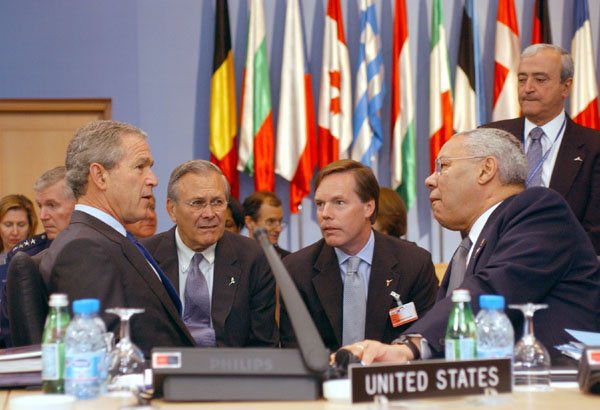

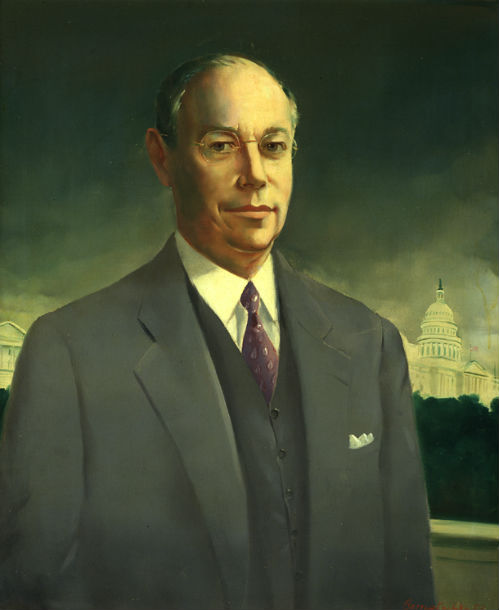


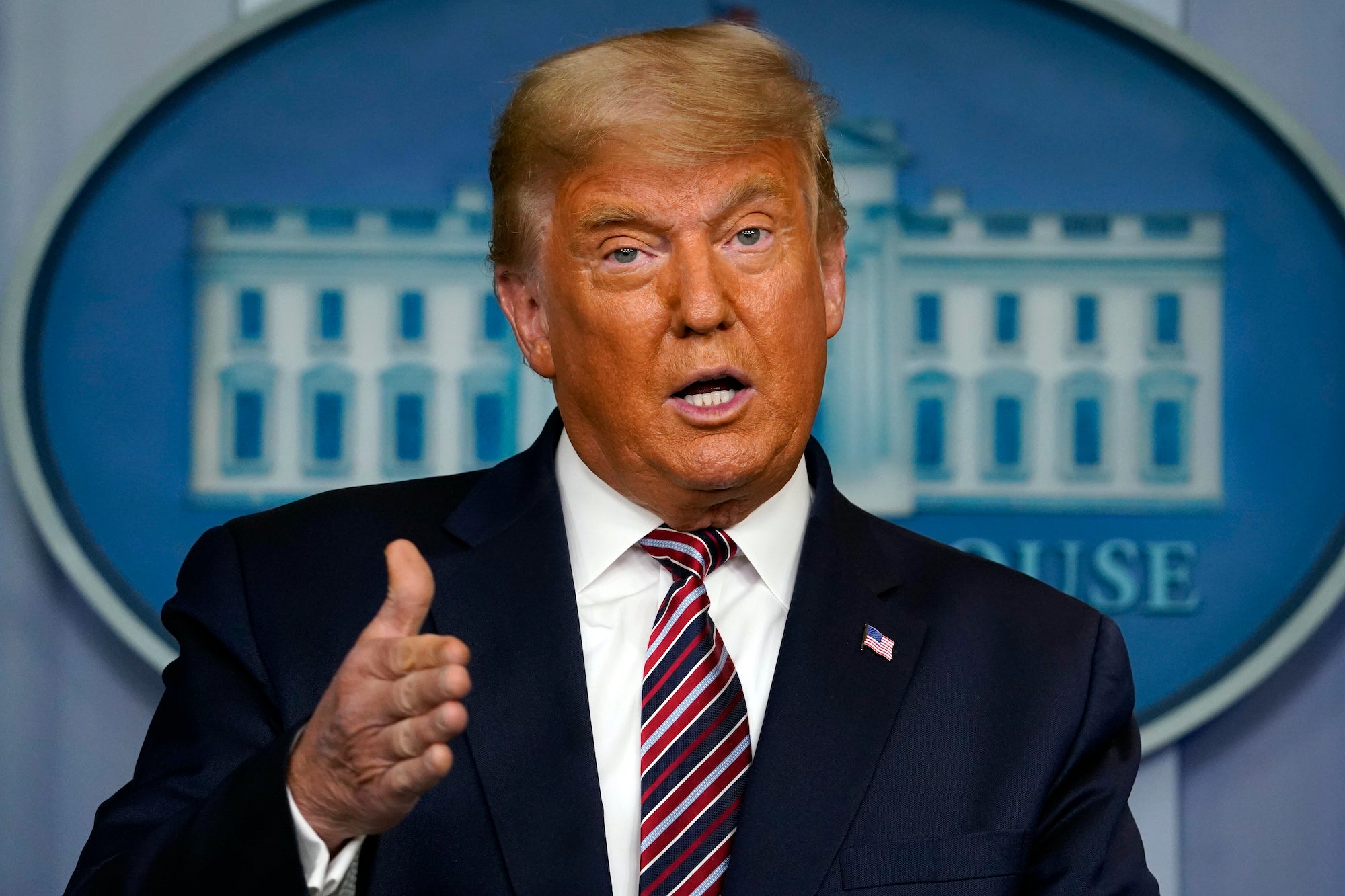








 OK... well, by your own article's definitions:
OK... well, by your own article's definitions: 



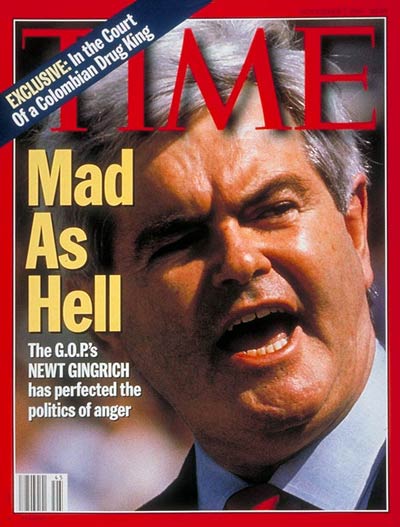
 Our Democrat administration's refusal to enforce our own borders is at least impeachable, if not also criminal.
Our Democrat administration's refusal to enforce our own borders is at least impeachable, if not also criminal.